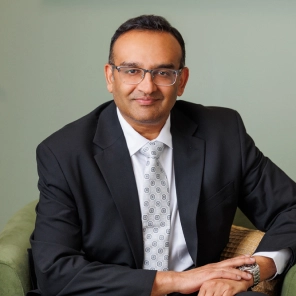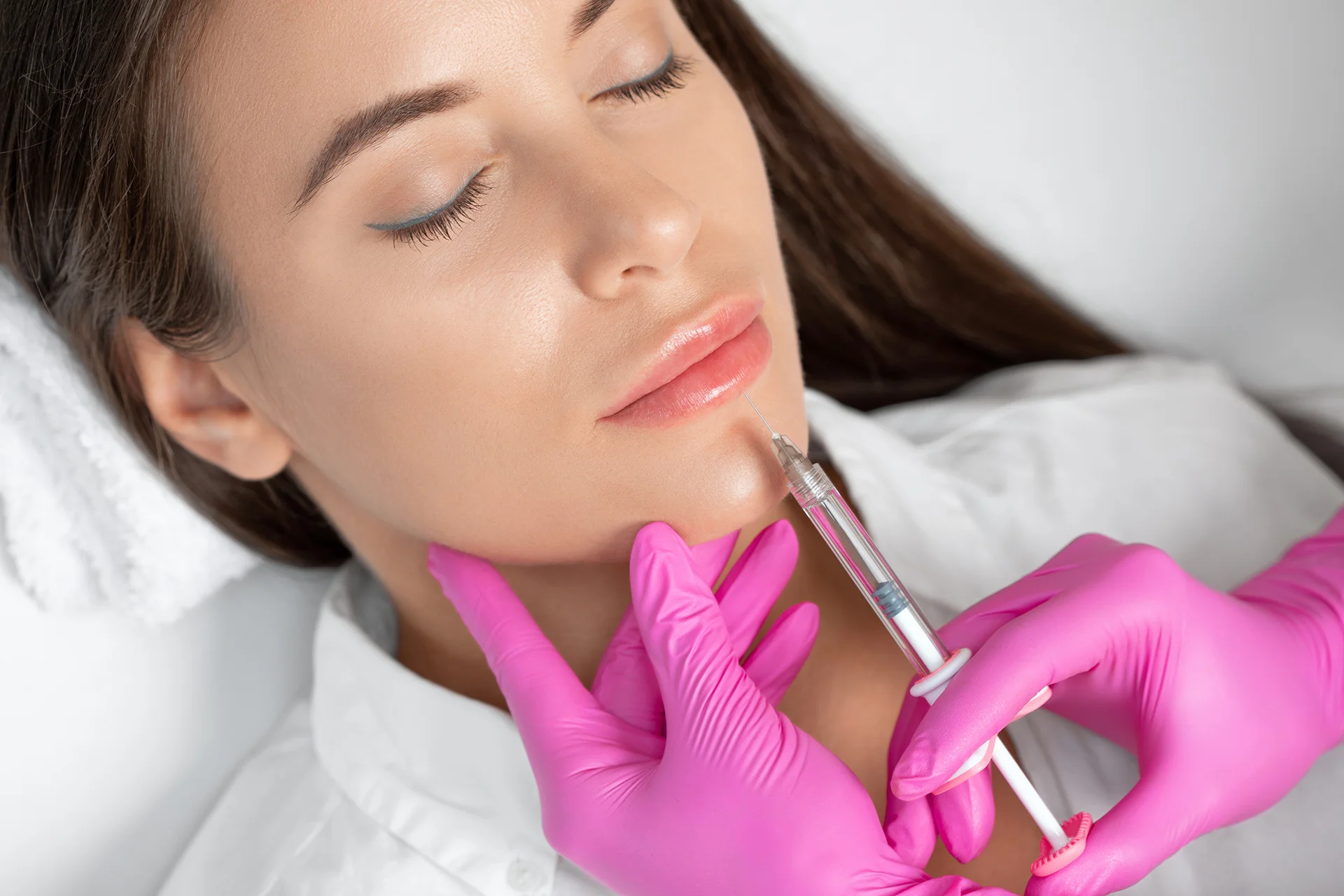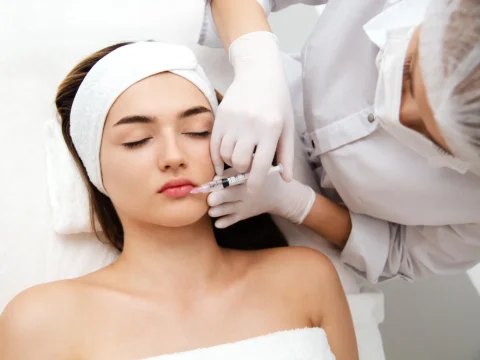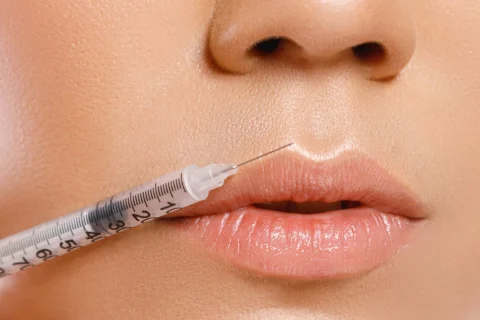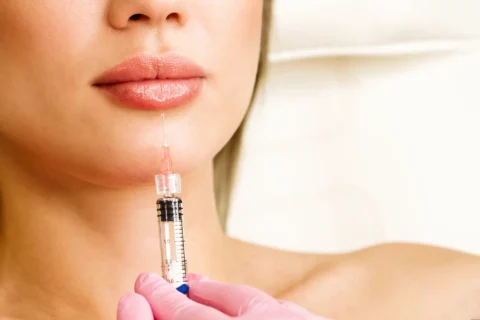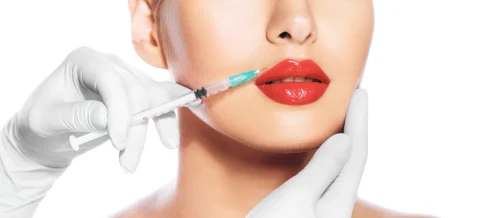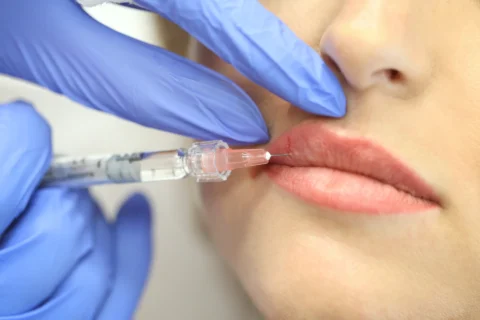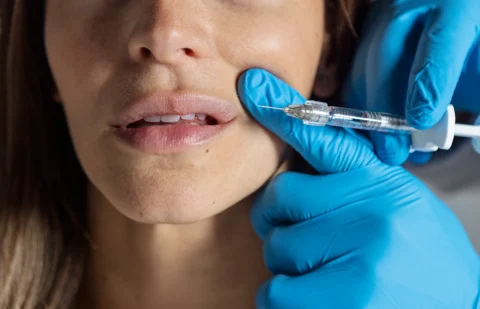At Ethos Aesthetics + Wellness, this is a common question we’ve been hearing from patients recently.
Our medical director, Dr. Soni, understands patients’ concerns about the potential effects of the COVID-19 vaccine on existing or planned aesthetic treatments like lip fillers.
As a board-certified cosmetic surgeon with extensive experience in minimally invasive procedures, Dr. Soni provides expert insight on how to safely manage treatments around the time of vaccination.
How the COVID-19 Vaccine Works
The Pfizer and Moderna mRNA vaccines work by inducing an immune response within the body against the spike protein of the COVID-19 virus.
This helps train the immune system to fight off an actual viral infection in the future. A robust inflammatory response is expected, as the body’s immune cells ramp up production of antibodies against the spike protein.
Common side effects from the vaccine like soreness, headache, fever, and fatigue are signs that the immune system is responding. While unpleasant, these effects are normal and resolve within a few days.
Lip Fillers and COVID-19 Vaccine
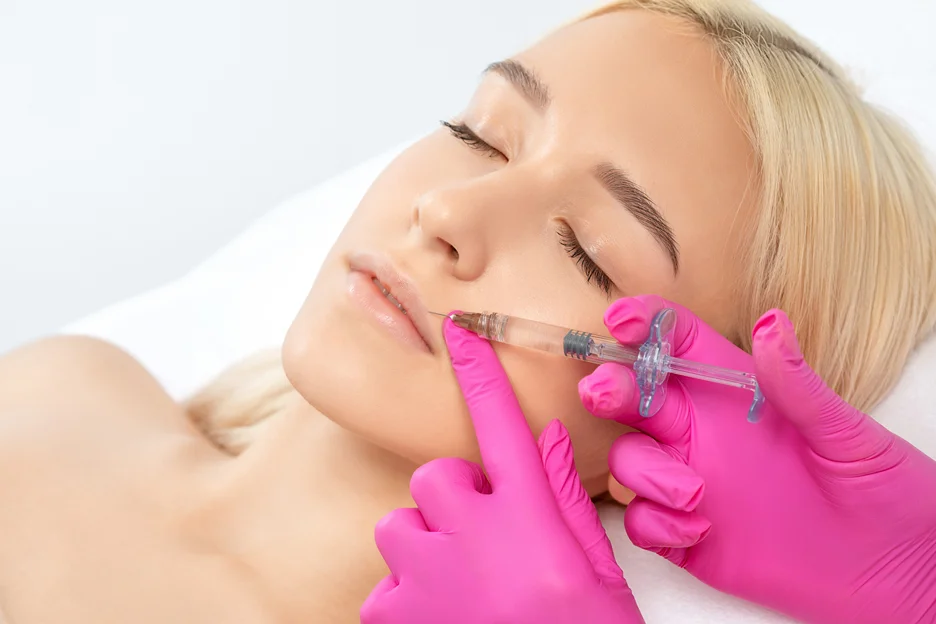
As individuals seek both aesthetic enhancements like lip fillers and protection against COVID-19 through vaccination, questions naturally arise about how these two aspects of personal well-being might intersect.
Let’s take a closer look into the potential relationship between lip fillers and the COVID-19 vaccine:
Lip Filler Immune Response Dynamics
The COVID-19 vaccine is designed to stimulate the immune system, particularly against the spike protein of the virus.
At the same time, lip filler procedures involve introducing a foreign substance, typically hyaluronic acid (HA), into the lips. HA fillers are generally well-tolerated, but their presence may interact with the immune system, potentially leading to increased inflammation or a different immune response than expected.
Timing Is Key
To minimize potential complications and ensure your safety, it’s crucial to consider the timing of lip filler treatments in relation to your COVID-19 vaccination schedule. Experts recommend waiting at least 2 weeks both before and after receiving the vaccine before getting lip fillers.
This allows time for any acute vaccine-related inflammation to subside and helps prevent excessive swelling or adverse reactions associated with lip fillers.
Individual Variations
It’s important to remember that individual factors can influence the relationship between lip fillers and the COVID-19 vaccine.
Factors such as your medical history, the location and volume of the lip fillers, and the type of vaccine you receive can all play a role in how your body responds.
Therefore, it’s advisable to consult with your cosmetic provider, like Dr. Soni at Ethos Aesthetics + Wellness, who can offer personalized guidance based on your unique circumstances.
By understanding the dynamics and considering timing and individual variations, you can make informed decisions about combining lip filler treatments with the COVID-19 vaccine, ensuring both your aesthetic goals and health remain a top priority.
Concerns About Lip Fillers and Inflammation
Since aesthetic lip treatments involve injection of dermal fillers into the lips, some swelling and inflammation is expected after the procedure as part of the normal healing process.
However, there are concerns that getting lip fillers too close to receiving the COVID-19 vaccine could worsen the inflammatory response and cause excessive swelling or other reactions.
The main worry is that the vaccine’s immune stimulation could interact with the filler material and cause more pronounced inflammation. Hyaluronic acid fillers are especially concerning, as hyaluronidase enzymes produced during an immune reaction can degrade and break down HA filler.
Lip Filler Timeline for Covid Vaccine
Based on the current data and our expert experience, Ethos Aesthetics + Wellness advises the following timeline when planning lip filler treatments around COVID-19 vaccination:
- Avoid lip filler injections at least 2 weeks prior to the first or second dose of the vaccine. This provides enough spacing for any swelling and redness to resolve, so your immune response to the vaccine is not intensified.
- Wait at least 2 weeks after the second dose to get lip fillers. By this time, the height of the vaccine immune response has passed. Filler complications are less likely once acute vaccination side effects fully resolve.
- After getting lip fillers, plan to receive the COVID-19 vaccine no sooner than 4 weeks later. This allows the filler to properly integrate, so the immune stimulation does not increase swelling or degrade the HA.
- If complications develop after lip fillers, such as nodules or unevenness, delay vaccination until these issues fully resolve. The vaccine could worsen existing inflammation.
Dr. Soni may recommend adjusted timelines based on individual factors like medical history, filler location and volume, and vaccine type. Follow our guidance, but always consult your cosmetic provider before scheduling fillers around your vaccine.
Lip Filler Complications After Vaccination
While rare, some patients may experience excessive lip filler swelling, nodules, redness, pain, or hardness after receiving the COVID-19 vaccine too soon before or after treatment. Contact our office immediately if you notice any of the following:
- Significant or sudden swelling, especially focused in certain areas
- Tenderness, bruising, redness extending beyond the lips
- Firm lumps or nodules in or around the lips
- Asymmetry or uneven shape of the lips
- Restricted lip movement when smiling or talking
Severe reactions may require prompt treatment with hyaluronidase enzyme dissolvers to reduce inflammation by degrading the problematic filler. Early intervention can help minimize further complications and achieve better outcomes.
How We Can Help
Dr. Soni and our team closely monitor all patients who receive lip fillers around the time of COVID-19 vaccination. We provide specialized post-procedure care instructions and follow-up evaluations to ensure optimal results and safety.
With years of advanced training and artistry, Dr. Soni achieves natural-looking, beautiful outcomes tailored to your unique facial anatomy.
We use the highest quality dermal fillers to minimize adverse reactions. Please contact Ethos Aesthetics + Wellness to learn more or schedule your lip filler consultation with Dr. Soni.
FAQ on Lip Filler and Covid Vaccine
What is the recommended spacing between lip fillers and the COVID-19 vaccine?
Dr. Soni advises waiting at least 2 weeks before and after vaccination to get lip fillers. This spacing helps avoid excessive inflammation and filler complications when the immune response is heightened.
Can I get the COVID-19 vaccine right after my lip filler appointment?
No, you should wait at least 2 weeks after getting lip fillers before receiving the vaccine. This allows time for the acute swelling and redness to resolve.
Does the type of vaccine impact timing with lip fillers?
The Moderna and Pfizer mRNA vaccines involve a similar immune response, so the timing recommendations are comparable. Always discuss your specific case with your cosmetic provider.
What if I develop swelling or lumpiness from my lip fillers after the vaccine?
Contact our office right away if you notice these or other complications like asymmetry or stiffness. Dr. Soni can evaluate you and may recommend hyaluronidase enzyme treatment to help reverse problematic inflammation.
Is there a risk of an allergic reaction to lip fillers after the COVID-19 vaccine?
Allergic responses are very rare with dermal fillers from reputable brands. However, having lips filled too soon before or after vaccination may increase swelling. Carefully follow Dr. Soni’s guidance on timing to prevent reactions.
When can I resume normal activities after lip fillers and the vaccine?
Avoid strenuous exercise for 24 hours after lip filler injections to reduce swelling. Wait to resume vigorous activities for at least a few days after vaccination as well, until any side effects subside.
Will my follow-up appointments be impacted by getting the COVID-19 vaccine?
Dr. Soni may recommend slightly adjusting future filler maintenance visits based on your response to the vaccine and overall inflammation levels. Routine appointments help ensure optimal long-term results.
Should I avoid other aesthetic treatments like Botox around the time of vaccination?
Neurotoxins like Botox are not affected by immune response the same way filler injections are. However, Dr. Soni still advises spacing out Botox by 2 weeks before and after the vaccine when possible.
When should I get lip fillers if I still need one or both vaccine doses?
It’s ideal to get your fillers 2 weeks before dose 1, then 2 weeks after dose 2. If lip fillers were already done recently, wait 4+ weeks after the final dose for your next injection.
What if I’m due for lip filler maintenance soon but also need the vaccine?
Coordinate carefully with Dr. Soni on timing if a filler touch-up is due around your vaccination schedule. It’s best to prioritize the vaccine, then address touch-ups at your next routine appointment.
This covers some of the most frequently asked topics related to combining lip filler treatments and COVID-19 vaccination. Please reach out to Ethos Aesthetics + Wellness with any other questions. Dr. Soni is happy to provide personalized guidance for your unique situation.
Prioritize Your Health and Aesthetic Goals With Confidence
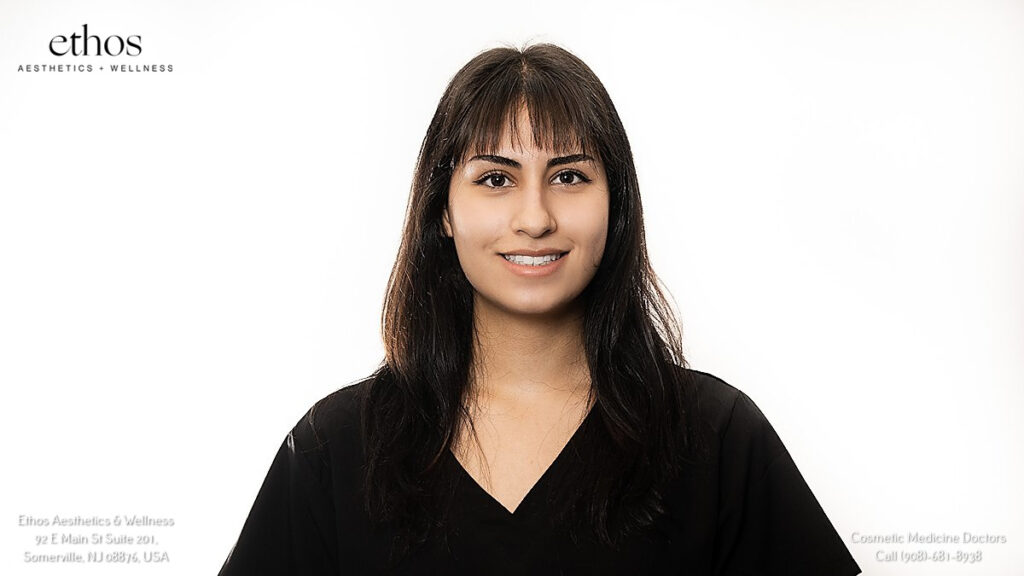
Contact Ethos Aesthetics + Wellness today for personalized guidance on combining lip filler treatments with COVID-19 vaccination. Dr. Soni is here to ensure your safety and stunning results.
